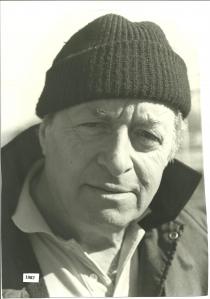We hope you enjoy this repost by one of our favorite men and fathers, Leonard Bishop. Happy Father’s Day!
by Leonard Bishop, Author of Dare to Be a Great Writer
It was a good day in both our lives. A day separated from the world of calamity and fright–from decisions and moralities. There was only Luke and me–a nine-year-old boy and his dad–fishing.
My son has become an eager fisherman. The only time he speaks to me these days is to ask, “Dad, take me fishing, please, please.” What I know about fishing you can hang from a gnat’s belly button and it would still not be weighted down. But fatherhood demands that I become my son’s role-model. That he patterned his growing-up-years after the masculine qualities in my character. My RUSH to adventure!
There is a large pond on a neighbor’s property. He has it stocked with all sorts of fish. Crawdads, bluegills, catfish, and other brand names that Luke has suddenly learned about. The neighbor agreed to let us fish there. We bought some hooks and line, some worms and red plastic balls that float (he calls them bobbers). I skinned a tree branch for a pole, and we went fishing.
Tom Sawyer and Huck Finn.
I sat on the grass, watching him lean the pole into the water. I can feel chiggers slowly burrowing into my skin. Squadrons of mosquitoes from the air, ready to target me. Luke, forgetting his vow of silence while his hook is in the water, calls to me, “Dad, how about you being in the one who cuts off the heads, okay?” I nod, “Sure,” though I am suddenly nauseous. I don’t want to touch those greasy looking slabs that gape at you with one eye.
I stare at his slender body, the gracefully slouched stance, how he licks his lips, the way of he grips the pole, and I am the total sensation of love. There he is, my son. Experiencing the right now of his life. He doesn’t want to become the president or crave to own a Porsche. There are no famines, no earthquakes, no world beyond the pond. He and his pole and the water are one. He just wants to catch fish.
What does he think about as he waits for a fish to take his bait. He is not thinking about ideas. He is inventing legends and imagining heroics. Hidden in the pond is a monstrous fish that has already swallowed 11 little boys. But the fearsome creature has never done battle with Luke Bishop–majestic in dream, magnificent in deed. He would hook the pond’s monster and hundreds of people would rush to witness the monumental struggle. Using every muscle in his small body, he would grapple the gilled villain into exhaustion, then beach the beast.
Newspaper people from as far as Marian and Hope would photograph him standing on the scaly titanic. Then he would suddenly stomp the gargantuan fish’s belly. The canyon huge mouth would open and 11 scared boys and a cute red-headed girl people had forgotten about, would rush out, charging to their joyous mothers. Cheers would rock the skies. And for his conquest of the Cyclopsian pond fish, he would be presented with an official boy scout knife initialed L. E. B.
Daydreams of splendorous adventure and grand heroics is what a nine-year-old boy thinks about when he’s fishing. Believing he might become discouraged if the fish are not biting I called to him, “How you doing, Kid?” He quickly puts his finger to his lips, shushing me, then shouts, “Don’t talk so loud, you’ll scare them away.” I whispered back, “Sure, Luke, okay–you betcha.”
Not all of fishing is delight and satin. He crimps his mouth and squirms with horror when I say, “Here’s a worm. Chop it in half and put it onto the hook.” He draws away and says, “you do the worming, Dad. I’ll do the fishing.” The long slippery thing slithers and oozes and the barb stabs my fingers. But I play macho and finally hand him his line. He rushes back, using his pole like a baseball bat, and casts.
I don’t want to enjoy fishing. It is a blatant waste of time. So many stories could be written in that time. I would rather balance my checkbook or have an old tooth drilled. But this is a pastoral interlude, a loving time between Luke and me. It is man and boy time. It is friendshipping and being just guys. It is maleness time. But sometimes, while I watch him fish, I feel dry with sorrow.
I see him growing up and his voice roughening, and he is intensely into sports and having fantasies about girls, and he has no time for a bumbling man who wants to sit and reminisce, “Hey, Luke, remember those summers we went fishing?” The days will change him, tyrannized in him, filling him. He is all pulse beats and electricity. I am twilight. I need eyeglasses to clearly see his face, and my thoughts fade.
Age softly talcum’s the mind and there is no great length of years ahead, so you ease into the dwellings of yestertimes. In the shadowy corridors of memory you call to your son, “Yo–hey, Luke, don’t forget your dad.” and your voice echoes and roles and slowly hushes while you watch yourself and your boy as you were then–and he’s in some other time in another place, becoming his manhood.
So you’ve got to love him now–every second. And while you are letting him go you must hold on to him. As long as you can–even if you have to join with him in fishing.
©2013 The Estate of Leonard Bishop
(first published July 14, 1988 the Manhattan Mercury)




